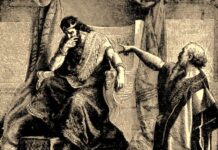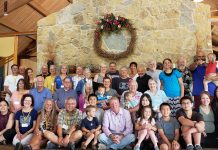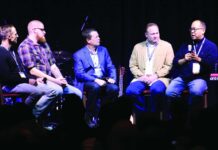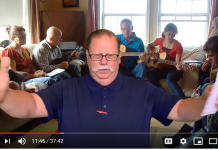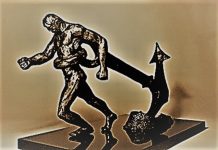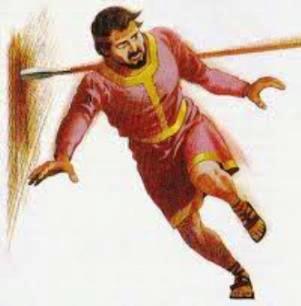His dreams of fulfilled destiny lay wrecked before him. From the heights of being anointed for the throne, and of a famous victory over one of Israel’s most forbidding enemies, David was now thrust from Saul’s service into a fugitive life. Far from the comforts of the palace, he found himself fighting for his survival alone in the wilderness.
But this time, instead of a Philistine giant, the threat was posed by the king of Israel himself, whom I’m sure David had legitimately felt was designed to be his mentor and patron. The word of the Lord through Samuel had been so clear; surely Saul would see that he was the anointed and bow to the Lord’s choice! Sadly this was not to be. The very one he looked to for support and promotion was now his enemy. Saul overtaken by jealousy made several attempts on David’s life driving him into one of the most perplexing trials of his oftentimes traumatic life.
A Generation after the Heart of David
This is a picture, in my view, of a new order – of this generation. There is alive in the earth now a new breed of Christian, of prophetic intercessors and seers, men and women of the Spirit, a truly apostolic and prophetic generation, who like David have been anointed and set apart for the throne. They have had a glimpse of the kingdom. And as a prophetic generation, they have seen the Lord coming in awesome revivals and outpourings of his glory filling the earth, overtaking whole cities and nations. But Saul, the “head and shoulders” leader (the “head” representing human thinking and the “shoulders” human government or control; see 1 Sam.9:2), is still on the throne.
Saul, signifying the whole spirit and system of an old order, is uneasy about this new breed of believer. In fact, he has driven many of them like David into hiding. And they are now waiting in the wings, as an “underground movement”, in the equivalent of what was for David, Adullam’s Cave – a place of darkness and anonymity. It’s a place of delayed dreams and disappointment. It’s a place where the Lord himself, through “the dark night of the soul”, will become their stronghold and refuge. A place without which they would not be the people they are destined to be, nor be equipped to carry the weight of glory that will soon be theirs. It’s a place of prophetic delay.
The Principle of Prophetic Delay
This is a principle of God’s operation. Every great move of God has been born through the gestation of a prophetic delay. Joseph received his vision as a 17-year-old youth, only to enjoy its fulfilment some 13 years later when finally at the age of 30, after being proven through many trials and disappointments, he was raised up to the saving of nations. The psalmist describes this principle: “He sent a man before them, Joseph, who was sold as a slave. They afflicted his feet with fetters; he himself was laid in irons, until the time that his word came to pass, the word of the Lord tested him” (Psa 105:17-19 NASB).
Now, here is the rub. During the delay the dream tests and refines us. So, the question right now is: how do we respond to the dilemma of delayed fulfillment?
Let’s have a look at how David handled it. In the truly candid way that only Scripture records, we see him responding both negatively and positively. At first, we see David in a “knee-jerk” survival response but in time finding God in such a way that he was changed and therefore readied for prophetic fulfillment. David was a man engaged in a process with God. Prophetically set apart and anointed for the throne but now standing in the darkness of Adullam’s Cave. Let us consider the nature of that process and learn the lesson for our generation – a lesson from the cave.
The Number One Lesson during Prophetic Delays
Despite initially fleeing to Samuel, to whom he unloaded about the injustice of Saul’s treatment (1 Sam. 19:18), he did not wait for the word of the Lord but fled to Jonathan. His confusion at Saul’s behavior is evident when David asked him, “What have I done? What is my crime? How have I wronged your father, that he is trying to take my life?” (1 Sam 20:1). Confused and smarting over the injustice he conspired with Jonathan to mislead Saul (v. 5-8). Having already engaged in deception and lying to preserve himself, he then fled to Ahimelech the priest where he again lied to cover the fact that he was fleeing from Saul (1 Sam 21:1-2). Still in survival mode he asked the priest for bread and a weapon.
The irony of David’s circumstances became stark. The only weapon at hand was the sword of Goliath of Gath. David who had faced down this raging and mocking enemy through a mere sling and stone was now in panic resorting to the same weapon that had already proven impotent against one with inferior weaponry, but whose trust was in a superior God. From what spiritual heights he had so suddenly fallen! But he was yet to fall further. From Ahimelech the priest he fled to the Philistines, to Goliath’s chief, the king of Gath himself. Here his former exploits are remembered. And so, reduced to feigning insanity by foaming at the mouth and dribbling into his beard, he was ejected from the king’s presence escaping finally to his hold at Adullam’s Cave.
Wow! What a sorry tale of human survival and cunning. David in confusion and panic rather than trusting the Lord resorted to human intrigue, lies, and manipulation to survive. Stripped of all his usual securities, his animal instinct for survival came to the surface. But why was God allowing this? What was this process all about? And how could David make some sense out of his sudden misfortune?
Despite appearances the Lord had not lost control of David’s life. As the apostle explains so clearly, “for it is God who is at work in us to will and do according to his own good pleasure”. And this is always to one end: so that we may “become blameless and pure as a child of God without fault in a crooked and depraved (twisted) generation” (Phil 2:13-15). To put it another way, you can get the man out of the system, but you can’t always get the system out of the man.
David had been thrust out of the system – out of the old order, but he was now on a crash course to get the system out of him. Any residue of the Saul nature in David was being exposed to set him free to be truly a man after the heart of God. Every twist of his inner-life was being straightened so that he could touch God’s heart and destiny for his generation. How can we be used of God except we be inwardly clean? As the prophet declared – “Be ye clean that bear the vessels of the Lord!”
So God was overseeing the circumstances of David’s life to work something within him. The one thing that robbed Saul of the kingdom was his inner-life. When confronted with a prophetic delay he grew impatient rashly offering sacrifice to secure his own leadership even though he had been clearly told to wait (1 Sam 15). His refusal to deal with his uncrucified self, manifested in self-will, self-preservation, and self-promotion ultimately lost him the throne and it passed to a better man (1 Sam 15:28).
But how could David be the “better man”? Surely he committed murder and adultery! Now, Saul never stooped to that but still lost the kingdom! Why? Without excusing David’s behavior, obviously God’s hierarchy of sin is vastly different to ours. In our view adultery and murder pretty well top the list while self-will or self-preservation would be close to the bottom. Even so, God’s ways are not ours. Saul’s sin of self-will was exposed, from God’s perspective, as in fact being witchcraft (1 Sam 15:23).
Paul elsewhere describes this problem as the flesh, explaining that it is antagonistic to the Spirit. This was the fundamental difference between Saul and David. While admittedly, David had significant lapses in character, when his self-life was confronted, he broke in repentance coming through the other side having processed deep inner-change (Psalm 51). This Saul refused to do. Consequently, the atmosphere of David’s life was characterized by worship and the presence of God – he was therefore, before all else, a man of the Spirit. God could not help but place his endorsement on this man possessed of a broken and contrite spirit.
So, caught in the processes of God, once in the cave, David turned to the Lord. Psalm 142 is the cry of his heart from inside Adullam’s Cave – from experiencing the “dark night of the soul”. In it he pours out his complaint and his troubles before the Lord (v. 1,2), and then completely overwhelmed he cries, “When my spirit grows faint within me, it is you who know my way” (v. 3). While men may look at his circumstances, pass judgment, and withdraw, the Lord knows and understands his way. His situation has been divinely orchestrated. God has allowed it to bring his servant to a place of complete weakness and inability. At last, this is it! This is where God wanted him! It is the number one lesson of the cave, of prophetic delay – the lesson of brokenness.
This one lesson deals a deathblow to the two greatest temptations during a prophetic delay: survival and self-fulfillment. We either resort to natural strength – our ability to organize, control, and manipulate or to the Lord for survival and dream fulfillment. He cries out, “…I am in desperate need; rescue me from those who pursue me, for they are too strong for me” (v.6). He is over his head. The enemy is too powerful. He is completely surrounded. So, unless the Lord shows up to deliver him and bring to pass the prophetic word he is dead – a victim of Saul, of the old order.
The Mark of the New Order
Therefore, the mark of the new order is not membership of a particular group or movement. It is whether we have yielded to the processes of God in the perplexity of prophetic delay and learned the lessons of the cave.
We stand at a transitional point in history – the overlap between an old order and the new. There is right now a new move of God being prepared in the wings. But before it breaks forth, we are being faced with a time of prophetic delay, and therefore with decisions – will we find refuge and dream fulfillment through human ability, “head and shoulders” government, or in the Lord? Will we cast ourselves in brokenness on him, or merely resolve to overcome in our own strength depending on our skill, training, and programs – on human strategy and planning? The purpose of prophetic delay, of transitional times, is probationary – we are being weighed in the balance – but will it fall to the old order of human control, or to the new order of humility and brokenness?
We are talking here about an inner quality of the spirit that is supernatural. It cannot be faked – it is more than cultural graciousness and good manners. It is something deep in the human spirit that only God himself can create.
It comes in the extremity of our circumstances – when we are either crushed by the weight of God’s awesome presence or overwhelmed without emotional, physical, or financial strength – when in utter weakness we call on the Lord.
Therefore, let us cry with David, “Create in me a clean heart, O God, and renew a right spirit within me”; for “the sacrifices of God are a broken spirit; a broken and contrite heart…” (Psalm 51:10, 17). And in this moment of prophetic delay let us also be confident that the One who lives in a high and holy place lives also with “he who is contrite and lowly in spirit, to revive the spirit of the lowly and to revive the heart of the contrite” (Isa 57:15).
REPRINT AGREEMENT: Duplication and re-transmission of this writing is permitted provided that complete source and website information for Lifemessenger is included.
Thank you.
Copyright © David Orton 2002
